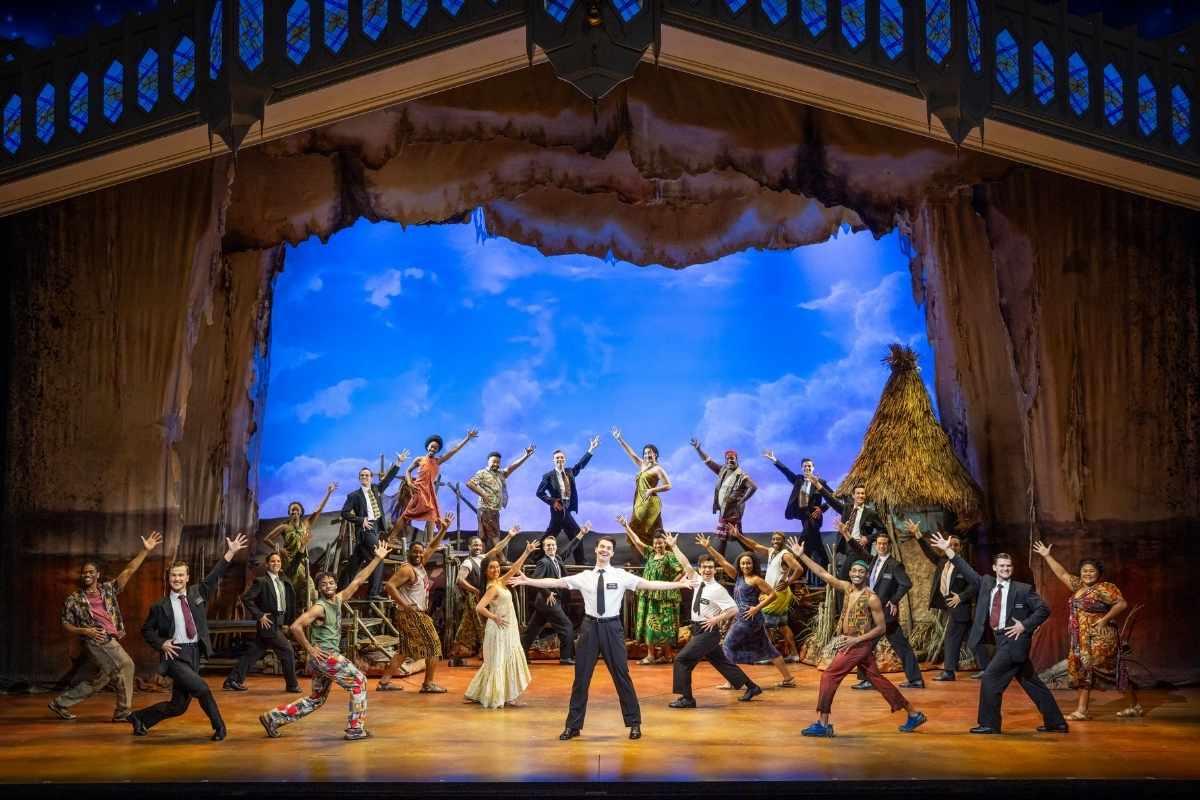Bold, blasphemous, and bizarre – 'The Book Of Mormon' is a profane hymn to the power of belief, that lives up to the hype.
Few musicals push boundaries quite like 'The Book Of Mormon', and its return to Sydney’s Capitol Theatre is a potent reminder why it remains one of the boldest, funniest, and most subversive musicals ever. Created by 'South Park'’s Trey Parker and Matt Stone, in collaboration with composer Robert Lopez, the global juggernaut is as irreverent as it is unexpectedly heartfelt.
The narrative follows two mismatched Mormon missionaries – Elder Price (Sean Johnston), the golden boy with delusions of grandeur, and Elder Cunningham (Nick Cox), a bumbling, socially awkward outsider – as they are sent to a remote Ugandan village to spread the word of Joseph Smith, founder of the Mormon religion. What begins as a satire of American missionary zeal quickly evolves into a biting critique of faith, colonialism, and the stories we use to make sense of the world.
From the opening number 'Hello!', the show bursts onto the stage with manic energy and pinpoint comic timing. Director Casey Nicholaw (and co-director Parker) keeps the action brisk and the humour razor-sharp, ensuring that the audience barely has time to catch their breath between laughs. The choreography, also by Nicholaw, is without doubt the show’s highlight. Slick and incredibly well-executed, it makes the musical a must-see.
As Elder Price, Johnston delivers a pitch-perfect performance, balancing self-righteousness with genuine vulnerability. His showpiece number 'I Believe' is unmissable, delivered with both comic bravado and surprising emotional nuance. Cox plays Elder Cunningham as delightfully chaotic yet deeply endearing – a character so desperate to be liked that he fabricates entire scriptures on the spot. His character arc is immensely watchable and satisfying, and his chemistry with Johnston is palpable, anchoring the show’s zaniness in a tumultuous, heartfelt friendship.
Paris Leveque brings a welcome dose of sincerity as Nabulungi, the hopeful young villager caught between harsh realities and the shiny promises of Mormon salvation. Her rendition of 'Sal Tlay Ka Siti' is a rare moment of stillness, beautifully sung and delicately performed, although it is hard to hear her at some points – a real shame given all she brings to the role. The other numbers 'Hasa Diga Ebowai' and 'Joseph Smith American Moses' bring the house down. The cast’s incredible performance and the songs’ absurdity make such numbers incredible, shocking, and entertaining all in one.

Image © Daniel Boud
Visually, the production dazzles. Scott Pask’s versatile set design shifts seamlessly between the sanitised suburbs of Salt Lake City and the bare Ugandan village, with beautiful and rich set pieces, aided by Brian MacDevitt’s sound lighting and Ann Roth’s vivid costumes.
Robert Lopez’s score remains one of the most infectious in modern musicals. From the hilariously repressed 'Turn It Off' to the surrealist chaos of 'Spooky Mormon Hell Dream', each number is a carefully crafted blend of Broadway pastiche and modern parody. The orchestra maintains tight control over the score’s rhythmic complexities and tonal shifts.
What elevates 'The Book Of Mormon' beyond shock comedy is its sincere core. Beneath the outrageous gags lies a genuine interrogation of belief, friendship, and the power of storytelling. It is this surprising emotional depth that makes it such a singular theatrical experience.
Of course, 'The Book Of Mormon' is not without controversy. Its depictions of Africa, while framed satirically, walk a fine line between critique and stereotype. Some audience members may find its humour abrasive, or its tone at odds with contemporary expectations around representation. But while the show risks offence at every turn, it consistently aims its satire upward – mocking Western saviourism, religious rigidity, and cultural blindness far more than it targets the communities depicted.
Ultimately, 'The Book Of Mormon' delivers. It is musical theatre at its most fearless and fun. Despite leanings towards a white saviour narrative, this confident and self-deprecating revival proves the show can still entertain, challenge, and charm in equal measure. If you missed its previous runs in Sydney, third time really is the charm.








